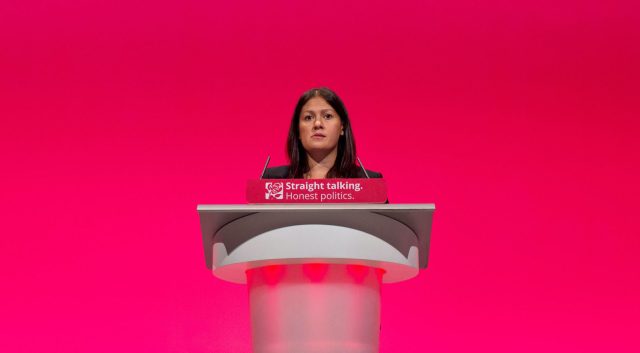(Photo by Ben Pruchnie/Getty Images)

I guess if I were still a member of the Labour Party (which I was technically until 31 December 2019, having finally got round to cancelling my annual direct debit earlier in the year), I would vote for Lisa Nandy as the next leader. Judging by her UnHerd interview from last summer, she is vaguely communitarian in outlook and does not think social conservatism is a disease (for which she has been criticised by the Twitter Left).
But, oh dear. Thank goodness I no longer have a dog in that fight. For much of the rest of the interview she displays the familiar intellectual and moral confusion of much of the modern left. Nandy in two respects is almost indistinguishable from your average Momentum activist.
First, the inability to see your political opponents as they are, not as your hateful, polarising caricature paints them. Nandy, in the UnHerd interview, accuses Dominic Cummings of being hostile to minority rights. Admittedly she does this via accusing him of wanting to smash liberal democracy (“which protects the rights of minorities”) and being “completely at odds” with the liberal democratic settlement. Cummings is evidently a radical who thinks Britain could work a lot better than it does but to paint him as an angry authoritarian happily stamping on minority rights is just laughable.
Second, Nandy indulges a moral sleight of hand in her conflation of working-class community spirit with a universalist ethos that is distrustful of any limit on the spirit of solidarity (surely close to the opposite of communitarianism).
She tells the story of how around 100 young male African asylum seekers were unexpectedly housed in a hotel in a small former pit village in her Wigan constituency. When this, unsurprisingly, caused a bit of a commotion she called a community meeting and told local people that Wigan had already taken more than its share of asylum seekers and that the council had some powers to refuse to house this latest intake. But she then seems to have shamed the locals into not asking for the Africans to be housed somewhere else.
Freddie Sayers, the interviewer, asks what if they had not accepted the asylum seekers. Would that have been OK too in the name of community empowerment? Nandy sidesteps the question and talks about the working-class tradition of strong community and sticking up for people who are having a hard time.
But we live in a world in which, notwithstanding recent improvements in the living standards of the poor, the vast majority of people on the planet are still “having a hard time” compared with the average citizen of Wigan (and most of the asylum seekers were almost certainly economic migrants, judging by recent refusal rates for asylum).
The whole point of a real community is that it is not a random collection of individuals and it does not encompass the whole world, it must by definition be bounded and should be relatively stable over time (not completely closed) allowing relationships of familiarity and reciprocity to thrive.
It may well be that the 100 young men did not stay that long and were, in any case, easily absorbed for a period by a good-spirited neighbourhood. But to imply that saying no to a substantial disruption to a small community would have somehow been antithetical to the spirit of working-class community is turning logic and the meaning of community on its head.
Nandy assumes that if you trust people and take their concerns seriously they will take the “right” decision. But I would like her to consider the possibility that saying “no” would have been equally acceptable in this case, particularly given Wigan’s disproportionate asylum burden to date. And most important, it would not primarily have been driven, as so many people on the metropolitan Left assume, by xenophobia and racism (notwithstanding some extreme-right grumbling) but by a legitimate spirit of community protection. She might at least have encouraged her constituents to negotiate for something in return for the disturbance.
There is plenty of evidence from social psychology that having a strong “in-group” identity does not translate into hostility to outsiders; if anything, it correlates with a more welcoming attitude. The desire for a reduction in immigration in general in places such as Wigan is based less on hostility to outsiders and more on a feeling that the needs of newcomers are taken more seriously by London (and the Labour Party) than the needs of locals. Immigration has also become an emblem for too-rapid social change that is not in the interests of places like Wigan.
There seem to be two Lisa Nandys. The communitarian sounding champion of the neglected people of Wigan, and the academic universalist who thinks we have equal obligations to all fellow humans, and who seems indifferent to a world of constant churn and high mobility. I would have voted for the first against the second, but it seems that both of them are standing to lead the Labour Party.










Join the discussion
Join like minded readers that support our journalism by becoming a paid subscriber
To join the discussion in the comments, become a paid subscriber.
Join like minded readers that support our journalism, read unlimited articles and enjoy other subscriber-only benefits.
Subscribe